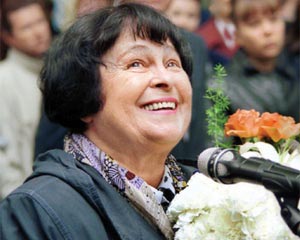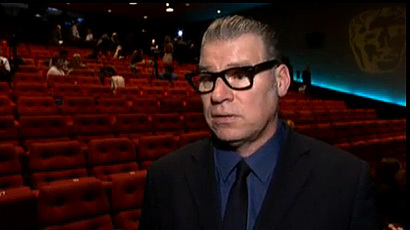Mikhail Trofimenkov's book The Film Theatre of War was born about four years ago when he was asked to write an article of about 1,500 words on Cinema and the Algerian War of Independence. Researching into the subject more and more he discovered that this was a subject that couldn't be confined to an article. Instead of the 1,500 words, Trofimenkov discovered that his 'article' had grown fifteen times the length and had become unprintable. The journals loss is our gain now that we have the 650 page book published by the St Petersburg film journal Seance to read. Trofimenkov had wanted to entitle his book Episodes of the Revolutionary War but, alas, Che Guevara had already picked that title up years before. This will give the potential reader a clue as to why this book by one of Russia's leading film journalists and scholars (thankfully, in Russia at least, the two roles are not always mutually exclusive) is a rather unique contribution to film history. Trofimenkov's achievement lies precisely in uncovering and revealing cinematic history in a way few scholars have managed to previously.
Film history has been the preserve of the academic who is used to think in certain well-defined categories but is rarely given the opportunity to really draw together correlations in the way that Trofimenkov does. So it is easy to imagine a title published in the UK or US entitled Cinema and Imperialism by a respected film academic, but it is almost inconceivable that anything similar to the book in question would have come from the pen of one other than Mikhail Trofimenkov. His book begins in Algeria in 1954 and ends at the end of the 1970s. Indochina, Algeria and French colonialism does take up the whole of Part One of the book but it then travels from land to land and continent to continent revealing a whole Atlantis-like continent of facts and characters in cinema and politics which (and who) have never been in the forefront of any historical account of cinema before. Who knew that in 1970 practically the whole Canadian film industry was arrested on charges of collaborating with terrorists as tanks rolled into Montreal? Historical events like this are on nearly every page of the book and one can't quite believe how the historians of cinema have for so long ignored the angle from which Trofimenkov writes.
Trofimenkov's book is not subsumable under any particular category or genre. He sets the record clear that the history of cinema and the history of imperialism have been parallel histories and that the history of cinema is part and parcel of the history of imperialism yet the heroes and protagonists of the book are those involved resisting these links to create a new cinema and to make cinema politically (rather than to make political cinema). Even if his book doesn't offer strong theoretical viewpoints, it does offer revelations given Trofimenkov's encylopaedic account of the films and characters hitherto hidden from our view by more conventional film historians. One can only surely say that after reading this book our view of Gillo Pontecorvo's Battle of Algiers will never seem the same again (as it represented the tip of an iceberg in the actual story of cinema and the Algerian anti-colonial struggle). The film, surely, could not have existed or become a classic of world cinema outside the context which Trofimenkov reveals in such painstaking detail. One ends up wanting to track down literally hundreds of films never previously mentioned in world cinema histories but which taken as a whole means that a cinematic history describing the decades of the 1950s, 1960s or 1970s can never be written in the same way ever again.
It is this aspect (as well as uncovering the names of those often martyred in pursuit of their attempt to both document and combat colonialism and post-colonialism) which makes the book such a revealing one as well as a passionate one. Trofimenkov explicitly makes this point in an interview for the journal Afisha:
И, конечно, у меня кроме академического пафоса, когда я ее писал, был и политический азарт. Подогреваемый слышанными со всех сторон либеральными восторгами по поводу Пиночета, Франко, Маннергейма, Хорти
And, of course, for me there was apart from the academic enthusiasm I had when I wrote the book, a certain political fervour. A fervour stoked up when I began to hear all the liberal ecstasy over figures like Pinochet, Franco, Mannerheim and Horty which was so prevalent from all sides.
Trofimenkov's account of how the Pinochet's of this world (so beloved by a certain Russian 'liberal' of the 1990s) not only wreaked repression on a massive scale but also destroyed a whole nations cinematic hopes and heritage (and eventually destroyed the very hope of a liberational cinema by the end of the 1970s) is, arguably, Trofimenkov's unique contribution to world cinema history. His is also a homage to the many figures whose lives were often cut short alongside their hope for this revolutionary third cinema in countries from Algeria to Palestine and from Chile to Canada, from France to Indonesia and Japan and from Italy to Argentina.
Trofimenkov's account is a political history of cinema (rather than a history of political cinema) the likes of which haven't been written before, even by the likes of politicised historians in the vein of Georges Sadoul. As Trofimenkov put it in an interview published in the St Petersburg Times:
“It’s a claim for the future,” Trofimenkov said.
“I see this book as a sketch of several chapters of the yet unwritten political history of cinema. There are many histories of the art of cinema in the world and there are many books about the business of cinema, but a political history does not exist. There are books about single episodes of the interaction between film and politics, say, about the occupation of France or about Nazi propaganda, and a bit about the political cinema of Latin America, but a universal political history of cinema does not exist.”
Trofimenkov's account of how the Pinochet's of this world (so beloved by a certain Russian 'liberal' of the 1990s) not only wreaked repression on a massive scale but also destroyed a whole nations cinematic hopes and heritage (and eventually destroyed the very hope of a liberational cinema by the end of the 1970s) is, arguably, Trofimenkov's unique contribution to world cinema history. His is also a homage to the many figures whose lives were often cut short alongside their hope for this revolutionary third cinema in countries from Algeria to Palestine and from Chile to Canada, from France to Indonesia and Japan and from Italy to Argentina.
Trofimenkov's account is a political history of cinema (rather than a history of political cinema) the likes of which haven't been written before, even by the likes of politicised historians in the vein of Georges Sadoul. As Trofimenkov put it in an interview published in the St Petersburg Times:
“It’s a claim for the future,” Trofimenkov said.
“I see this book as a sketch of several chapters of the yet unwritten political history of cinema. There are many histories of the art of cinema in the world and there are many books about the business of cinema, but a political history does not exist. There are books about single episodes of the interaction between film and politics, say, about the occupation of France or about Nazi propaganda, and a bit about the political cinema of Latin America, but a universal political history of cinema does not exist.”
The 'Guevarian moment' of Trofimenkov's account is that he recounts film not as an historical event and neither does he recount film from the viewpoint of a scholar interested in purely cinematic terms but rather because film becomes the event itself. He writes about film as war and cinema as revolution. As the St Petersburg columnist notes just about all the most courageous and talented protagonists of Trofimekov's book are communists (very often dissident ones- Trotskyist or Anarcho-Communists) and revolutionaries. Trofimenkov's book is, in many ways, a much-needed encomium for revolutionary cinema as well as a lament for the times when revolutionary cinema was still possible before political cinema mutated into the 'humanitarian cinema' of Costa Gavras or Margaret von Trotta.
Hopefully, it is also a pointer to a future resurrection or rebirth of revolutionary cinema. But in any case it is, perhaps, the most important book on cinema that has been written for some time and not just in Russia. For it not to be translated in many languages as possible would be an oversight of the gravest order.
Finally, in the interview for the St. Petersburg Times Trofimenkov indicates the direction that he would like to see cinema in Russia take giving the example of Svetlana Baskova's For Marx as a possible pointer:
“Repeating the same trajectory of most other political directors, she also shoots an ongoing film without an end by filming workers’ protests. This is cinema, but it’s absolutely the same thing they did in Mexico and Argentina a while ago.





















